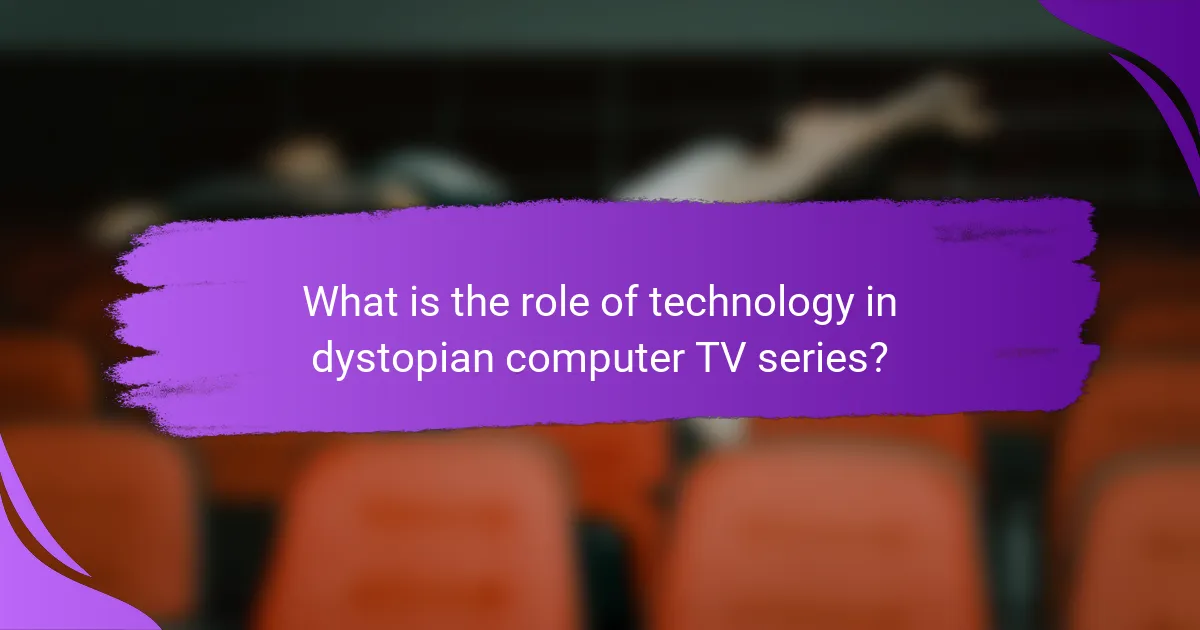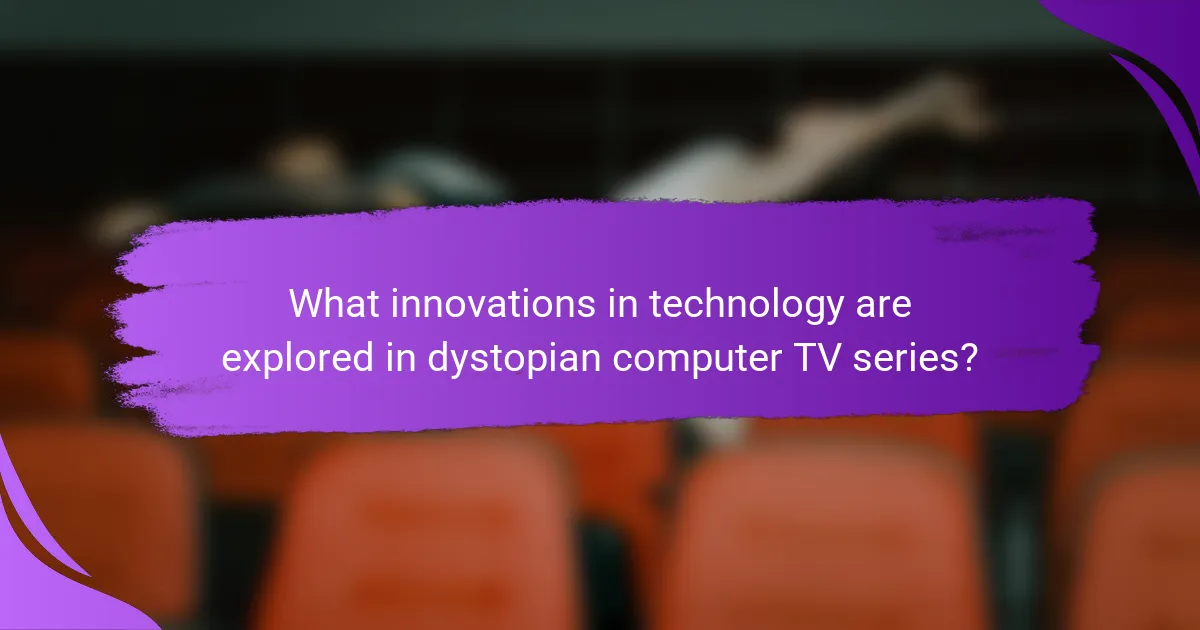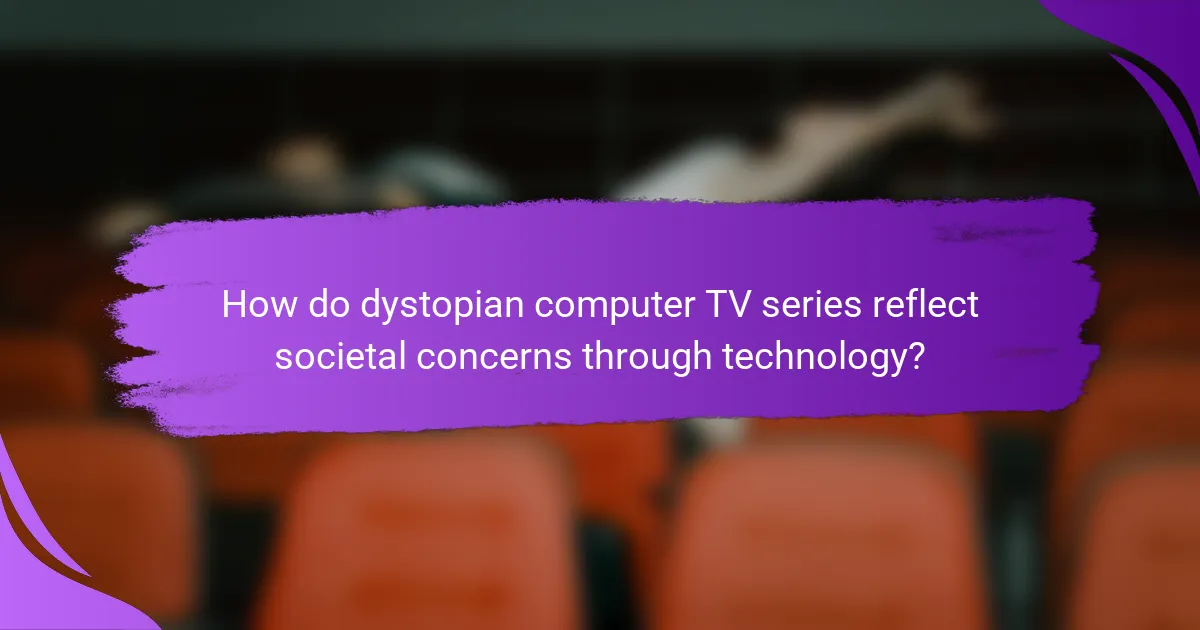Technology is a central theme in dystopian computer TV series, serving as a tool for control and surveillance within society. These narratives often feature advanced innovations such as artificial intelligence, surveillance systems, and genetic engineering, reflecting societal anxieties about the implications of technological advancements. Series like “Black Mirror” and “The Handmaid’s Tale” illustrate the potential negative outcomes of these technologies, including loss of privacy and authoritarian governance. By examining the dual nature of technology in these narratives, the article explores how these themes resonate with contemporary concerns and stimulate critical discussions about the ethical implications of technological progress.

What is the role of technology in dystopian computer TV series?
Technology serves as a critical element in dystopian computer TV series. It often represents the means of control and surveillance over society. Dystopian narratives frequently depict advanced technologies that enable authoritarian regimes to monitor citizens. Examples include pervasive surveillance systems and AI-driven decision-making. These technologies illustrate the loss of privacy and autonomy. They also highlight societal dependence on technology for daily functioning. Additionally, technology often acts as a double-edged sword, providing both solutions and new problems. This duality reflects real-world concerns about technological advancements. Overall, technology shapes the thematic landscape of dystopian narratives, influencing characters and plot development.
How do dystopian computer TV series depict technology?
Dystopian computer TV series depict technology as a tool for control and surveillance. These series often showcase advanced technologies that infringe on personal freedoms. For example, they illustrate how artificial intelligence monitors individuals’ actions and thoughts. Surveillance systems are frequently portrayed as omnipresent, creating a sense of paranoia. Additionally, technology is depicted as a means of social manipulation and propaganda. These narratives often reflect societal fears about the loss of privacy and autonomy. In series like “Black Mirror,” technology’s potential for harm is explored through cautionary tales. The portrayal serves as a critique of contemporary technological advancements and their implications for society.
What are the common technological themes found in these series?
Common technological themes in dystopian computer TV series include surveillance, artificial intelligence, and virtual reality. Surveillance often plays a central role, showcasing how technology enables constant monitoring of individuals. Series like “Black Mirror” highlight the consequences of invasive surveillance technologies on personal freedoms. Artificial intelligence is frequently depicted as both a tool for societal control and a potential threat to humanity. In “Westworld,” AI beings challenge the boundaries of consciousness and ethics. Virtual reality is another prevalent theme, often used to escape from bleak realities. “The Matrix” exemplifies how virtual environments can manipulate perceptions of reality. These themes collectively reflect societal anxieties about technological advancements and their implications.
How does technology influence the narrative in dystopian settings?
Technology serves as a catalyst for conflict and societal change in dystopian narratives. It often creates oppressive systems that control individuals, such as surveillance, artificial intelligence, and biotechnology. For example, in George Orwell’s “1984,” technology enables constant surveillance, shaping the characters’ lives and actions. Similarly, in “Black Mirror,” various episodes illustrate how advanced technology can lead to moral dilemmas and societal collapse. These narratives reflect real-world concerns about privacy, autonomy, and the ethical implications of technological advancements. Thus, technology not only drives the plot but also serves as a mirror to contemporary societal issues.
Why is technology a central theme in dystopian narratives?
Technology is a central theme in dystopian narratives because it often represents both progress and peril. Dystopian stories frequently explore the consequences of unchecked technological advancement. This theme highlights the potential for technology to dehumanize societies. For instance, surveillance systems in narratives like “1984” illustrate the loss of privacy. Additionally, artificial intelligence can lead to loss of control, as seen in “Black Mirror.” These narratives reflect societal fears about reliance on technology. They serve as cautionary tales about the future. Overall, technology plays a crucial role in shaping the dystopian landscape.
What societal fears does technology represent in these series?
Technology in dystopian series represents fears of surveillance, loss of privacy, and dehumanization. These narratives often depict advanced surveillance systems monitoring individuals constantly. This evokes anxiety about personal freedoms being eroded. Additionally, technology is shown to replace human jobs, leading to economic instability. The portrayal of artificial intelligence often highlights fears of loss of control over autonomous systems. Characters frequently struggle against oppressive technological regimes, illustrating societal concerns about authoritarianism. The depiction of social isolation caused by technology also raises alarms about mental health impacts. These themes resonate with real-world issues, reflecting public apprehensions about the future of technology in society.
How does technology reflect real-world issues in dystopian stories?
Technology in dystopian stories often mirrors real-world issues, highlighting societal fears and challenges. For instance, surveillance technology reflects concerns about privacy in modern society. Many dystopian narratives depict governments using technology to monitor citizens, similar to contemporary debates over data privacy and surveillance practices. Additionally, artificial intelligence in these stories raises questions about job displacement and ethical decision-making. This resonates with ongoing discussions about automation’s impact on employment. Furthermore, environmental degradation depicted through advanced technology showcases the consequences of neglecting climate change. Such portrayals serve as cautionary tales, urging audiences to consider the implications of technological advancements. These narratives utilize technology as a lens to critique current societal trends and provoke thought on future ramifications.

What innovations in technology are explored in dystopian computer TV series?
Dystopian computer TV series explore several innovations in technology. These include advanced artificial intelligence systems that control societies. Surveillance technologies are commonly depicted, monitoring citizens’ every move. Virtual reality environments often serve as escapism from harsh realities. Genetic engineering is frequently portrayed, altering human capabilities and ethics. Autonomous drones and robotics demonstrate the potential for loss of human jobs. Blockchain technology appears in narratives about decentralized control and privacy. Social credit systems illustrate the impact of technology on personal freedoms. Each of these innovations reflects societal anxieties about future technological developments.
How do these series portray advanced technologies?
These series portray advanced technologies as both innovative and detrimental to society. They often showcase futuristic inventions that enhance daily life. For example, artificial intelligence is depicted as a double-edged sword. While it offers efficiency, it also raises ethical concerns about control. Surveillance technologies are frequently highlighted, illustrating privacy erosion. Characters may rely on advanced gadgets for survival or rebellion. The narratives often reflect societal anxieties about technological dependence. Additionally, the consequences of technological misuse are explored, emphasizing caution. Overall, these portrayals serve as cautionary tales about unchecked technological advancement.
What types of futuristic technologies are commonly featured?
Futuristic technologies commonly featured in dystopian computer TV series include artificial intelligence, virtual reality, and advanced robotics. Artificial intelligence often drives plotlines, showcasing machines capable of human-like reasoning. Virtual reality creates immersive environments for characters, blurring the lines between reality and simulation. Advanced robotics is frequently depicted as either aiding or threatening humanity. Other technologies include biotechnology, which explores genetic manipulation and enhancement. Surveillance systems are also prevalent, highlighting themes of privacy invasion. These technologies reflect societal anxieties about the future and human existence.
How do these technologies impact character development?
Technologies in dystopian computer TV series significantly impact character development by shaping their motivations and interactions. For instance, surveillance technologies create a sense of paranoia that influences characters’ decisions. Characters often exhibit traits of rebellion or conformity based on their relationship with technology. The use of artificial intelligence can lead to existential crises, prompting characters to question their humanity. Additionally, virtual realities can alter characters’ perceptions of themselves and others. These technologies serve as catalysts for growth or decline, affecting relationships and moral choices. In series like “Black Mirror,” technology drives characters to confront ethical dilemmas, showcasing their complexities. Overall, the portrayal of technology is integral to understanding character arcs within these narratives.
What are the consequences of technology in dystopian settings?
Technology in dystopian settings often leads to oppression and loss of individuality. Surveillance systems monitor citizens, creating a culture of fear. This constant observation restricts personal freedoms and stifles dissent. Additionally, technology can facilitate the manipulation of information, skewing public perception. For instance, state-controlled media spreads propaganda, shaping societal beliefs. Automation may displace jobs, leading to economic disparity and unrest. Furthermore, the over-reliance on technology can result in a loss of essential human skills. In many narratives, these consequences culminate in societal collapse or rebellion against oppressive regimes.
How does technology contribute to societal control in these narratives?
Technology contributes to societal control in dystopian narratives by enabling surveillance, manipulation, and enforcement of conformity. Surveillance systems, such as cameras and data tracking, monitor citizens’ actions and behaviors. These technologies create an environment of fear and compliance. Manipulation occurs through information control, where media and communication are censored or altered. This limits citizens’ access to diverse perspectives and critical thinking. Enforcement of conformity is achieved through algorithms that encourage homogeneous behaviors and thoughts. For example, social credit systems reward conformity and punish dissent, promoting a culture of obedience. These mechanisms illustrate how technology serves as a tool for authoritarian governance in dystopian settings.
What ethical dilemmas arise from technological advancements in these series?
Technological advancements in dystopian computer TV series often present ethical dilemmas. These dilemmas include issues of privacy invasion due to surveillance technologies. The use of artificial intelligence raises concerns about autonomy and decision-making. Additionally, the manipulation of information can lead to misinformation and propaganda. The impact of technology on social inequality is another significant ethical concern. Characters in these series frequently face moral choices regarding the use of advanced technology. The consequences of these choices often reflect real societal issues. For example, the portrayal of technology can critique current trends in data usage and control. Overall, these dilemmas serve as a commentary on the potential consequences of unchecked technological progress.

How do dystopian computer TV series reflect societal concerns through technology?
Dystopian computer TV series reflect societal concerns through technology by depicting potential negative outcomes of technological advancements. These series often showcase surveillance, loss of privacy, and authoritarian control enabled by technology. For instance, “Black Mirror” explores how social media and virtual reality can distort human relationships and societal norms. In “The Handmaid’s Tale,” technology is used to enforce oppressive regimes, highlighting fears of governmental overreach. Such narratives serve as cautionary tales, urging viewers to consider ethical implications of technology. By exaggerating current trends, these series stimulate critical discussions about the relationship between society and technological development.
What societal issues are mirrored in the portrayal of technology?
The portrayal of technology in dystopian computer TV series mirrors societal issues such as surveillance, privacy invasion, and social inequality. These series often depict a world where technology is used for mass surveillance, reflecting real-world concerns about government monitoring. For instance, shows like “Black Mirror” illustrate how technology can invade personal privacy, resonating with ongoing debates about data protection. Additionally, the portrayal of social inequality is evident in series like “The Hunger Games,” where technology exacerbates class divisions. This reflects growing awareness of economic disparities in society. Furthermore, the depiction of dependence on technology highlights issues of addiction and mental health, paralleling rising concerns about screen time and its effects. Overall, these portrayals serve as cautionary tales about the potential negative impacts of technology on society.
How do these series critique current technological trends?
These series critique current technological trends by highlighting their potential negative impacts on society. They often depict scenarios where technology exacerbates social inequalities. For instance, shows like “Black Mirror” explore how surveillance and data privacy issues can lead to dystopian outcomes. They showcase the dangers of over-reliance on technology in everyday life. The portrayal of artificial intelligence often raises ethical questions about autonomy and control. Additionally, these series reflect public anxieties about technological unemployment and loss of human connection. They serve as cautionary tales, warning viewers of the consequences of unchecked technological advancement.
What lessons can viewers learn from the depiction of technology in dystopian worlds?
Viewers can learn the potential dangers of unchecked technological advancement in dystopian worlds. These narratives often illustrate how technology can lead to surveillance, loss of privacy, and authoritarian control. For example, in “Black Mirror,” episodes like “Nosedive” show how social media can dictate personal worth. This reflects real-world concerns about digital reputation and mental health. Additionally, “The Matrix” explores themes of reality manipulation through technology. It warns about the consequences of losing touch with genuine human experiences. These stories serve as cautionary tales, urging viewers to critically evaluate technology’s role in society.
What practical insights can be gained from the role of technology in these series?
The role of technology in dystopian computer TV series provides insights into societal fears and aspirations. These series often depict advanced technologies that reflect contemporary concerns about surveillance, privacy, and autonomy. For example, shows like “Black Mirror” illustrate the potential consequences of unchecked technological advancement. The series highlights how technology can lead to alienation and ethical dilemmas. Additionally, they explore the balance between innovation and human values. The portrayal of artificial intelligence raises questions about morality and control. Overall, these narratives serve as cautionary tales that encourage critical thinking about future technological developments.
How can viewers apply the themes of technology in dystopian narratives to real-life scenarios?
Viewers can apply the themes of technology in dystopian narratives to real-life scenarios by recognizing the potential consequences of technological advancements. Dystopian stories often depict technology as a tool for oppression or surveillance. This reflects real-world concerns about privacy and government control in the digital age. For example, the rise of [censured] recognition technology raises ethical questions about surveillance and civil liberties.
Moreover, narratives often highlight the disparity created by technology, such as the digital divide. This mirrors real societal issues where access to technology is unequal. By analyzing these themes, viewers can become more aware of the implications of technology in their own lives. They can advocate for responsible tech use and policies that protect individual rights. Understanding these narratives encourages critical thinking about current technological developments.
The main entity of this article is technology in dystopian computer TV series. The article examines the critical role technology plays in shaping narratives, highlighting themes such as surveillance, artificial intelligence, and virtual reality. It discusses how these technologies serve as tools for societal control, reflecting real-world concerns about privacy, autonomy, and ethical dilemmas. Additionally, the article explores various innovations depicted in these series, their impact on character development, and the societal issues mirrored through technology, offering insights into the implications of technological advancements in contemporary society.